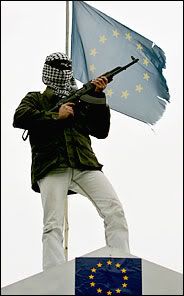MUST READ ARTICLE !! A Sobering Thought :The Border between Freedom of Speech and the Sacred

Read here original in Times Online
Some two decades ago, relations between Europe and the Islamic world were convulsed by the controversy surrounding the publication of the book The Satanic Verses.
It is depressing that cartoons first printed in a Danish newspaper last autumn appear to have had much the same effect now.
It should not, alas, be surprising.
The cultural chasm has, if anything, grown in the past 20 years.
Many in Europe today think nothing of mocking the most revered aspects of Christianity — often in a crass, tasteless manner — while the abject corruption and failure of secular regimes in the Middle East have helped to inspire a revival of Islam, including a most extremist strain.
None of which excuses a situation in which the governments of France and Denmark have felt obliged to advise their citizens to avoid areas such as the Gaza Strip where the offices of the EU were stormed yesterday.
There is undoubtedly a sizeable aspect of domestic politics surrounding events in the Palestinian Authority and elsewhere.
It would also, though, be folly to deny that many individual Muslims have been aggrieved by the very fact of images of the Prophet Muhammad.
This newspaper has had anguish of its own over whether to reproduce the pictures at the centre of this saga.
At one level, their appearance might be seen as an appropriate response to the extremists who have demanded their prohibition and could help the reader to understand both their character and the impact that they might have on believers.
But to duplicate these cartoons several months after they were originally printed also has an element of exhibitionism to it.
To present them in front of the public for debate is NOT a value-neutral exercise.
The offence destined to be caused to moderate Muslims should not be discounted.
On balance, we have chosen NOT to publish the cartoons but to provide weblinks to those who wish to see them.
The crucial theme here is choice.
The truth is that drawing the line in instances such as these is not a black-and-white question.
It cannot be valid for followers of a religion to state that because they consider images of the Prophet idolatry, the same applies to anyone else in all circumstances.
Then again, linking the Prophet to suicide bombings supposedly undertaken in his honour was incendiary.
The Times would, for example, have reservations about printing a cartoon of Christ in a Nazi uniform sketched because sympathisers of Hitler had conducted awful crimes in the name of Christianity.
Muslims thus have a right to protest about the cartoons and, if they want, to boycott the publications concerned.
To move from there to holding ministers responsible for the editorial decisions of a free press in their nations, to urge that all products from a country be ostracised or, worst still, to engage in violence against people or property is to leave the field of legitimate complaint and enter one of censorship enforced under threat of intimidation.
That free speech is misunderstood in much of the Islamic realm shows how much progress has YET to be made.
Consistency would also be a virtue.
The anger directed at these cartoons by certain Muslims would carry more weight if pictures that crudely insult Jews and Christians were not found regularly in the Middle East.
To contend that faiths of many forms merit a degree of deference, but not absolute protection, is one notion.
To insist that this principle be applied selectively is another, quite indefensible, assertion.



0 Comments:
Post a Comment
Go to Latest Posting